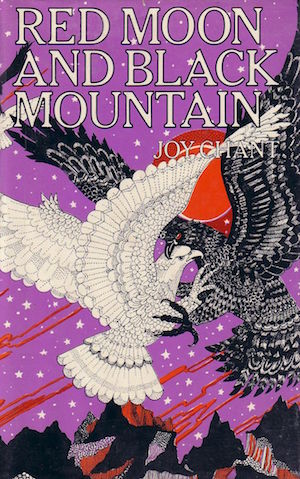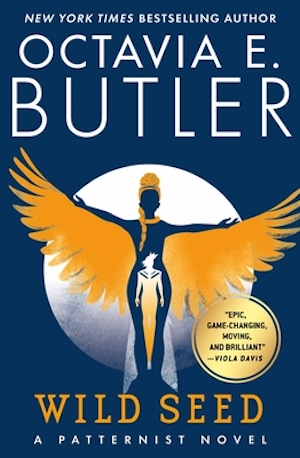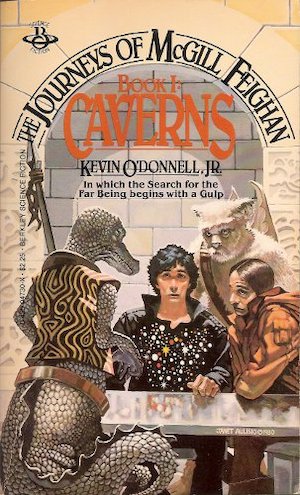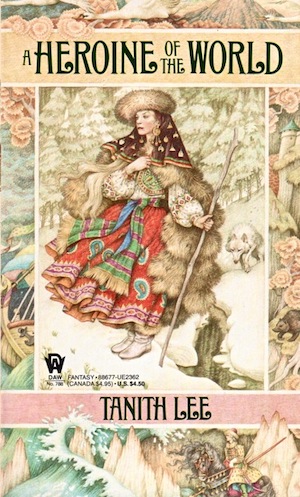Sometimes I succumb to nostalgia and look through my collection of roleplaying games from the dawn of the industry. These games were produced by companies now long forgotten and their prospects of being revived are quite remote.1 Recently I looked over my edition of SPI’s Universe, whose spectacular star map I referenced in this earlier Tor.com essay. I opined that SPI could have copied GDW’s gambit and used their StarSoldier/Outreach games to provide their Universe game with a more detailed future history. A savvy commenter called my attention to a worldbuilding detail in those boardgames I had either overlooked or forgotten…
To quote Atomic Rockets:
In the game, starships or “TeleShips” are jumped or “shifted” instantaneously from one location to another several light-years away by teams of women with psionic powers. Shifting cannot be done by a machine, it has to be done by a person. The supply of psionic or “telesthetic” women is limited. There is no way to genetically engineer them, they naturally occur at the rate of one First Order Telesthetic per million females (why? because Redmond Simonsen is trying to force a specific situation). Energy is cheap, any ore or element can be synthesized, any material good can be manufactured.
So the only valuable interstellar commodity are telesthetic women.
The use of the word “commodity” underlines an unfortunate truth: valuable is not the same as powerful. One might think a particular class of person having a monopoly on an economically vital activity would make them powerful. No—it makes whoever controls them powerful. A quick glance at history shows many, many cases where considerable force was used to compel useful people to perform necessary services for little to no reward, from manual labour to reproduction. Perhaps SPI’s background, were it to be further detailed, would show powerful women dominating galactic politics…but it’s just as likely that telesthetic women are traded, controlled, and denied personal autonomy.
Perhaps some fictional examples are in order, since historical examples would no doubt set the comments on fire (so let’s please avoid that).
Red Moon and Black Mountain by Joy Chant (1970)

In a magic-imbued realm far from ours, the land of Vandarei faces a seemingly insurmountable challenge. Drawing on the power of his dark lord, the great sorcerer Fendarl has methodically wrapped himself in defense spells. The kingdoms the evil sorcerer covets have their own mages and wise ones, but their power cannot harm Fendarl. Nothing from Vandarei can hurt the wizard, leaving him free to scheme conquest.
Of course, there is an obvious loophole. If nobody and nothing from Vandarei can affect Fendarl, why not simply kidnap three courageous English children from another universe and set them to the task of dealing with the wizard? Two of them are press-ganged; Oliver, the third, is subjected to mindwipe. He is given a new identity as Li’vanh and constrained to accept the world-saving tasks only he can do…such as facing the sorcerer in personal combat or becoming a human sacrifice.
When I first read this, decades ago, I thought it was just another amiable portal fantasy. In fact, it’s a grim little tale about the cost of victory.
Wild Seed by Octavia E. Butler (1980)

No person works as hard to find and gather humanity’s psionic adepts as Doro. Doro has invested millennia tracking down, gathering, and breeding mutants to ensure that they survive and flourish. Thanks to Doro’s endless work, the genes for psionic talents have been concentrated and encouraged to flourish.
However, this long-standing project had nothing to do with any particular concern for mutant-kind or a belief in orthogenesis. Doro is a psychic predator. Mutant minds are tasty and their appropriated bodies provide him with comfortable temporary accommodation. Worse, the psychics are quite aware of Doro’s appetites. They simply lack the means to resist him. The best that shape-shifting immortal Anyanwu can do is to play a weak hand as well as she can, using Doro’s desire for a peer to limit the damage he does to her kin.
Caverns by Kevin O’Donnell, Jr. (1981)

Following his ingestion and regurgitation by an enigmatic alien, young McGill Feighan discovers that he has been marked out for destiny in a second way. He is a Flinger, able to transport himself and others across the Milky Way simply by willing it. Flingers are the foundation on which galactic commerce is founded, thus McGill is ensured of lofty status.
What he won’t have is autonomy. Flingers are not simply essential personnel. Each Flinger is a potential living WMD. The same Flinger ability that lets teleporters match velocity with other worlds allows them to toss objects at kilometers per second. Moreover, careless Flingers can easily spread plague from world to world. Their masters, therefore, methodically brainwash young Flingers. Each succeeding generation perpetrates this arrangement in the name of the greater good.
A Heroine of the World by Tanith Lee (1989)

Aradia’s mother and father, confident of their nation’s invincibility, blithely ride off to war and death by exploding munitions dump and ill-fated cavalry charge, respectively. Aradia’s despairing aunt chooses suicide rather than witness her nation’s occupation by the victorious Kronians. A stunned thirteen-year-old Aradia is left to fend for herself as foreign armies swarm into her native land.
Unfortunately for Aradia, she is strikingly attractive. Flag Colonel Keer Gurz provides protection from men even worse than he is; the cost is that an unwilling Arcadia must become his mistress and later his wife. When he dies, Arcadia is again left unprotected. Again must settle for a loathed lover. It seems that each man who covets her is both powerful and doomed.
The Beautiful Ones by Silvia Moreno-Garcia (2017)

Valérie Beaulieu lives in a world in which some folks have telekinetic talents. One might think that this would totally change the setting, but it doesn’t. There are aristocrats and common folk. There are wealthy people and poor people. Some aristocrats are financially embarrassed but they can trade access to the upper levels of society for money. Marriageable aristocratic women like Valérie are the coin used to seal alliances between ambitious plutocrats and grasping aristocrats. Loyalty to her impoverished family forced Valérie to reject her true love, impoverished Hector Auvray, to submit to a loveless marriage to wealthy Gaetan.
A decade later, Hector returns to Loisail a wealthy, famous telekinetic adept. There is, of course, no hope of a rekindled romance with married Valérie. However, Valérie’s niece Nina is just as pretty as her aunt, has telekinetic promise, and would make a suitable replacement for Nina’s aunt. Or so Hector feels. Valérie takes a very different view of the matter. Not only is the Nina–Hector relationship a personal affront, but Valérie has a far more advantageous match in mind for Nina. A match that she is willing to promote by every means she possesses.
History is on course to repeat itself.
***
The difference between valuable and powerful is, of course, something many writers have played with over the decades. No doubt you have your own fictional examples you are astounded I did not mention. The comments are, as ever, below.
In the words of Wikipedia editor TexasAndroid, prolific book reviewer and perennial Darwin Award nominee James Davis Nicoll is of “questionable notability.” His work has appeared in Publishers Weekly and Romantic Times as well as on his own websites, James Nicoll Reviews and the Aurora finalist Young People Read Old SFF (where he is assisted by editor Karen Lofstrom and web person Adrienne L. Travis). He is a four-time finalist for the Best Fan Writer Hugo Award and is surprisingly flammable.
[1]“Universe” is an example of a game whose fundamental rules should produce outcomes quite different from the outcomes shown. In Universe, interstellar jumps are dependent on rare psionicists but are instant and cost no energy. Interplanetary travel uses mundane equipment, consumes energy, and is slow. To me, that suggests space transport should be divided into interstellar ships that stay out past the jump limit, and interplanetary craft that shuttle passengers and cargo out to the jump limit. The fact that this is not how it works in the game has vexed me since 1981.











Valuable ≠ powerful is a recurring theme in Tanith Lee stories.
A counter-example is Robert Heinlein, The Moon is a Harsh Mistress. The moon colony started as a prison colony. Women were in short supply. Heinlein states that it resulted in women having a lot of social power and agency. I think that that is highly unlikely, for the reason that James mentioned.
The O’Donnell reminds me of Anne McCaffrey’s Talents universe stories, where the psionic people are all working for the government.
Me! Me! (Jumps up and down waving frantically at nine-book series where a useful genetically controlled trait—the ability to jaunt between parallel time-lines—has inexplicably sub-optimal effects on reproductive politics and female emancipation. At least until someone reads about test-tube babies while visiting another time line and decides to buy a reproductive medicine clinic …)
I still that that’s an unnecessarily nasty way to read a game setting I’m pretty sure was intended – admittedly in a rather second wave essentialist way – to be a consciously gentle setting for a wargame.
I generally find it less disappointing to assume the social side of challenges will be handled in the stupidest and cruelest manner possible: thus recent laws in what had been seen as an advanced nation decreeing that their women should have less bodily autonomy than a corpse. Great Powers in StarSoldier/Outreach games need to maximize their First Order Telesthetic populations, which can only be done by maximizing the number of women. I can see ways this could be done humanely but what I would expect is something along the lines of Decree 770.
https://en.wikipedia.org/wiki/Decree_770
@5 I believe you are correct. In the “historical” notes for StarForce (the game which introduced the setting) Simonsen explicitly mentions that the military aspects of his history are relatively low-key compared to those we’re used to. And, while it doesn’t come up in those notes, in an interview in a contemporary magazine (I think Fire & Movement but my memory on this is vague) he said that the “only women have this ability” aspect was there to annoy the more sexist male gamers.
As I recall, the golden in Delany’s “The Star Pit” fall into the category, too.
What was the name of that well-spun yarn about a community of white people who conspired to marry into Osage families who happened to own property rich in oil, property that could only be passed down through inheritance, so they could murder the Indigenous folks and systematically take over their properties? As we all know, that would never really happen, but it was quite the tale.
The only one on this list I’ve read is the Flinger’s series by O’Donnell. I’m pretty sure I read the whole series in the early 80’s in paperback. One thing that sticks out in my mind is McGill spends years searching for the alien that swallowed him to find out why he did it. They finally meet and McGill isn’t the Chosen One with a destiny after all. I don’t seem to have my paperbacks anymore but it turns out Amazon has e-editions if I’m feeling nostalgic. The Butler and the Lee just sound way to depressing right now.
O’Donnell was a wonderful writer, and I enjoyed the heck out of the McGill Feighan books. I noted that his books are being reissued by a small press that distributes electronic copies through Baen books, and they are well worth seeking out.
People who can wish other people into another star system ought to have agency. Not every star system has planets. Some are just a star, and some comets I guess.
Very interesting to read about the concept of TeleShips jumped by psionic powers from the Universe game, when did this game come out? Because there was an – unfortunately – short lived German SF pulp series called “Die Terranauten” (1979 – 81) that used the same concept, a group of psi powered individuals (not gender locked) were needed to jump a ship through hyperspace (also needing a mistletoe from a mysterious tree for focus and navigation).The psionic “Treiber” fit also very nicely into this topic as they were needed by society but were also both feared and made politically powerless.
Fifth Season would be another one.
StarForce: Alpha Centauri came out in 1974, Outreach in 1976, and StarSoldier came out in 1977. Universe was released in 1981.
I believe the Crystal Singer series by Anne McAffrey would qualify. The singers are well paid but not in great control of their own destiny nor able to wield much political power. This does skirt pretty close to your request to avoid real life examples such as musicians.
The Lll in Delany’s Empire Star are an obvious example, even if it’s awfully sad to own them.
Telesthetics: art criticism at a distance?
@15 Thank you, James!
I think that the cassandra sangue in Anne Bishop’s The Others series fits this description.
@14 Yes indeed, you’d think the Broken Earth Trilogy would be the first thing to have come to mind instead of obscure titles from back in the day. That it took over a dozen comments to surface leads me to suspect that I am not the only old fart in the room, because Jemisen’s series is AMAZING. Incipient senility is my only excuse.
Time for the Stars by Heinlein is another, though the stakes for the characters aren’t very high. One of twins or triplets are taken into space for experiments in ftl for experiments in telepathic communication. It’s not awful, but it isn’t fun, either.
Glory Road is an example of power not being freedom. Star is the Empress of Fifty Universes, but she can’t leave and walk the glory road.